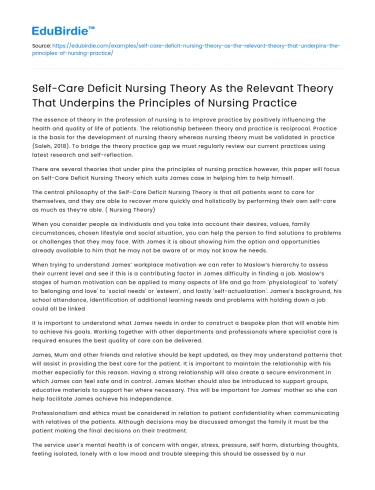The essence of theory in the profession of nursing is to improve practice by positively influencing the health and quality of life of patients. The relationship between theory and practice is reciprocal. Practice is the basis for the development of nursing theory whereas nursing theory must be validated in practice (Saleh, 2018). To bridge the theory practice gap we must regularly review our current practices using latest research and self-reflection.
There are several theories that under pins the principles of nursing practice however, this paper will focus on Self-Care Deficit Nursing Theory which suits James case in helping him to help himself.
Save your time!
We can take care of your essay
- Proper editing and formatting
- Free revision, title page, and bibliography
- Flexible prices and money-back guarantee
The central philosophy of the Self-Care Deficit Nursing Theory is that all patients want to care for themselves, and they are able to recover more quickly and holistically by performing their own self-care as much as they’re able. ( Nursing Theory)
When you consider people as individuals and you take into account their desires, values, family circumstances, chosen lifestyle and social situation, you can help the person to find solutions to problems or challenges that they may face. With James it is about showing him the option and opportunities already available to him that he may not be aware of or may not know he needs.
When trying to understand James’ workplace motivation we can refer to Maslow’s hierarchy to assess their current level and see if this is a contributing factor in James difficulty in finding a job. Maslow’s stages of human motivation can be applied to many aspects of life and go from 'physiological' to 'safety' to 'belonging and love' to 'social needs' or 'esteem', and lastly 'self-actualization'. James’s background, his school attendance, identification of additional learning needs and problems with holding down a job could all be linked
It is important to understand what James needs in order to construct a bespoke plan that will enable him to achieve his goals. Working together with other departments and professionals where specialist care is required ensures the best quality of care can be delivered.
James, Mum and other friends and relative should be kept updated, as they may understand patterns that will assist in providing the best care for the patient. It is important to maintain the relationship with his mother especially for this reason. Having a strong relationship will also create a secure environment in which James can feel safe and in control. James Mother should also be introduced to support groups, educative materials to support her where necessary. This will be important for James’ mother so she can help facilitate James achieve his independence.
Professionalism and ethics must be considered in relation to patient confidentiality when communicating with relatives of the patients. Although decisions may be discussed amongst the family it must be the patient making the final decisions on their treatment.
The service user’s mental health is of concern with anger, stress, pressure, self harm, disturbing thoughts, feeling isolated, lonely with a low mood and trouble sleeping this should be assessed by a nurse as soon as possible.
There is a duty of care towards James’ safety and where the patient shows signs of posing a danger to himself or others, appropriate actions must be taken to prevent harm or injury. Care, support and positive thinking will always help prevent but having healthy coping mechanisms in place will help keep everyone safe and restore calm quickly. Identifying triggers as a preventative measure is paramount in reducing incidents.
Working with James to achieve his goals a plan should be drawn up through a simultaneous evaluation of James’ psychological, emotional and physical state and his effect on his ability to perform complex and personal activities of daily living. The plan should improve the James’ mental health looking holistically at all aspects of their life. It should consider their current and future environments, studies, career, life, friends, support, medication etc. It should create an independent future allowing him ambitions and opportunities. The plan must also consider the needs to the patient and their relatives. It should provide the training and further education for his future career as well as life mentors and support groups.
Regular monitoring to assess James progress with follow up communication enables additional support to be offered as soon as required.






 Stuck on your essay?
Stuck on your essay?

